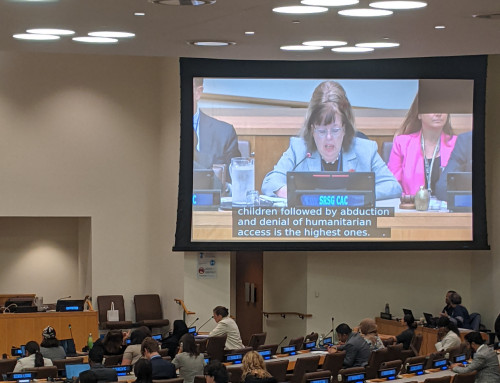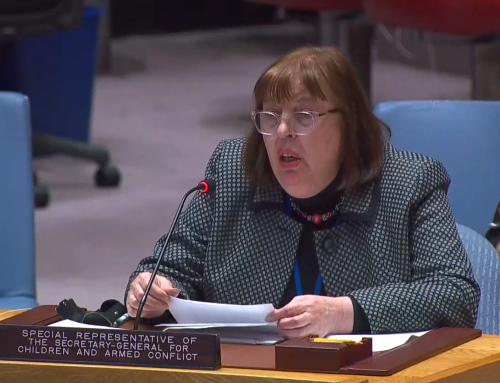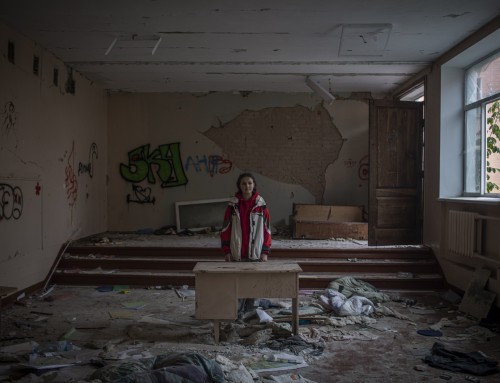Address to the Human Rights Council
Geneva, 20 September 2007
Radhika Coomaraswamy
Under-Secretary-General,
Special Representative of the Secretary-General
for Children and Armed Conflict
Mr. Chairperson, distinguished delegates, ladies and gentlemen,
I am pleased to be able to present to the Council my report of 2006/2007. I am sorry I was not able to present this report earlier this year. As you are aware, the General Assembly and the Security Council are seized with the issue of Children and Armed Conflict. It is imperative that the Human Rights Council also join this common effort to end impunity and protect children during times of war. As conveyed in the Machel Study, “war violates every right of the child – the right to life, the right to be with family and community, the right to health, the right to development of the personality and the right to be nurtured and protected.”
Mr. Chairman,
In addition to the report, I feel it is my duty to report to the Council on the missions I have undertaken this past year. Since assuming my role as Special Representative for Children and Armed Conflict, in February 2006, I have committed myself to undertaking field visits as a central element of my advocacy strategy to bring high-level attention to the plight and circumstances of children affected by armed conflict.
It is important to stress that these visits are carried out to support the advocacy and programmatic work of operational partners on the ground essentially to raise the level of awareness globally on their work, and to help to further open the space for dialogue and action.
It is also important to point out that I have engaged in dialogue for the explicit purpose of child protection with all parties, both state and non-state, whose actions have a significant impact on children. However, such dialogue, particularly with non-state actors, does not imply or confer political recognition or legitimacy of such parties.
Mr. Chairperson,
Although a wide range of issues and themes have been covered during the course of my visits, I have made an effort to focus more concerted attention on four primary concerns: the recruitment and use of children as soldiers; grave sexual violence against children; the safety and access of humanitarian personnel; and rehabilitation and reintegration of children.
Sri Lanka
In November 2006, I appointed former Ambassador Allan Rock as my Special Advisor to visit Sri Lanka to ascertain the situation on the ground, with a particular focus on the action plan for children and armed conflict agreed between the Government and the Liberation
Tigers of Tamil Eelam (LTTE) following peace talks in 2002 and 2003. Under this plan the LTTE committed to working with UNICEF to end the recruitment of children, and facilitate the release of underage recruits in their ranks. With the full cooperation of the Government, my Special Advisor was able to access all areas of the country and to gain extensive knowledge of the situation of conflict affected children primarily in the North and the East. The mission’s initial findings revealed that the LTTE has not complied with its commitments: underage recruitments continue and several hundred children as verified by UNICEF have not yet been released. It was also ascertained that the break-away Karuna faction of the LTTE abducts children in government-controlled areas of the East, with credible evidence that certain elements of the Sri Lankan army may have aided in this practice. In addition, humanitarian workers have been killed and NGOs threatened in an increasingly militarised environment.
Following the visit of my Special Advisor to Sri Lanka, the following commitments were made: The LTTE gave assurances that they would work with UNICEF to accelerate the release from their ranks of all children under the age of 17 from their ranks, with the objective of completing this process by the beginning of 2007. (Unfortunately, the LTTE did not commit to the full release of children under the age of 18 years in contravention to applicable national and international law). They also committed to better training for their military commanders in relation to recruitment, and instituting a process to discipline those who do not comply; The Karuna faction undertook to publish formal policy statements forbidding under-age recruitment and to release children who may be in their ranks. They also agreed to work with UNICEF in an effort to trace the whereabouts and arrange the release of those abducted children whose families have notified UNICEF; The Government of Sri Lanka committed to undertake an independent and credible investigation into the allegations that elements of the Sri Lankan army have aided the abduction and recruitment of children by the Karuna faction and has recently announced the formation of a Committee to Inquire into Allegations of Abductions and Recruitment of Children for use in Armed Conflict.
The Security Council Working Group on children and armed conflict has requested that a report on progress be submitted by October 2007. The continuing violence continues to exacerbate the problems of IDP children and the delivery of humanitarian assistance.
Mr. Chairperson,
On my mission to Sudan in January 2007, I visited Juba in the South as well as Darfur, noting that the conflict has affected most of the population. I concluded that there exists a prevailing culture of impunity for violations against children. In Darfur, the situation is aggravated by an acute security vacuum, in the context of which armed groups terrorize and brutalize the civilian population as well as humanitarian workers with full impunity. In Juba, the central issue was no-longer grave violations or the continuing recruitment of children, but the difficulties encountered in their reintegration into society and challenges related to the most basic infrastructure for the wellbeing of children.
The following commitments were made by the Government of National Unity and the Government of Southern Sudan to: first to allow UNICEF and UNMIS to visit and audit the Sudan Armed Forces (SAF) Sudan Peoples Liberation Army (SPLA), as well as the military barracks of allied armed forces and groups, and to allow the United Nations, together with an appropriate Government focal point such as the National Commission for Child Welfare, to monitor and verify the existence of children in their forces. Second, to allocate adequate resources for reintegration of children formerly associated with armed forces in their communities. Third to adopt and implement in a timely manner national legislation to criminalize recruitment of child soldiers. Fourth to establish, jointly with the United Nations, a Task Force on Sexual Violence and Abuse Against Children. Fifth to ensure the safety and protection of humanitarian personnel. Despite these commitments, the UN country team continues to work with the Government of Sudan to ensure action and implementation.
In addition, key signatories and non-signatories of the Darfur Peace Agreement committed to cooperate fully with the United Nations in the preparation of action plans to identify and release children associated with their forces and to institute a system of monitoring and verification. UNICEF Sudan has followed up on these commitments since my visit culminating in the formulation of necessary action plans. These are also being monitored by UNMIS in the context of the monitoring and reporting mechanism called for under Security Council Resolution 1612.
Burundi
The purpose of my visit to Burundi in March 2007 was primarily to follow-up the recommendations of the Security Council Working Group on Children and Armed Conflict (SCWG-CAAC) regarding the situation of children and armed conflict in the country. I met with the President and senior ministers and was encouraged by the progress made to ensure greater protection for children and efforts to ensure the timely re-integration of children associated with armed groups. However, I remain deeply concerned with the continuing lack of full compliance by the FNL
Since my visit to Burundi I have also met with the Peacebuilding Commission to urge attention to the needs of conflict affected children and in particular for longer term reintegration strategies to be seen as an integral part of peacebuilding. Successful reintegration is not only important for the children themselves but will also ensure future stability and cohesion in war torn societies
Democratic Republic of Congo
I visited the Democratic Republic of the Congo in March this year, meeting with the Prime Minister, senior Ministers as well as many of the commanders in the eastern provinces. I urged the authorities to take timely and decisive action against violators of children’s rights and I called for the arrest of commander Biyoyo, who had previously been tried and convicted for recruitment of children and is currently at large. Despite strong commitments of the newly elected government, I remain deeply concerned about the situation of children especially in the eastern provinces, where the situation continues to shock the conscience of the world.
It is critical to undertake all necessary measures to demobilize children who are still in the ranks of the non-integrated armed groups as well as in the Congolese Armed Forces through the brassage and/or mixage process. I was also deeply concerned by the extent of sexual violence in eastern Congo and the climate of impunity that prevails for these crimes. I visited Panzi hospital and spoke with many girls who had been subject to multiple rapes and humiliation and was able to learn of the efforts by UNFPA and partners to deal with this terrible problem. The Congolese authorities made the firm commitment that they will take all measures to fight impunity, in consultation with the UN. The situation in the eastern Congo continues to deteriorate and it is time to take necessary action against militia leaders such as Laurent Nkunda and the leaders of the FDLR.
Mr. Chairperson,
Lebanon
The situation in the Middle East has been a continuing concern to child protection actors, especially after the war between Lebanon and Israel in 2006. I therefore visited the region in April 2006. In Lebanon I met with the Prime Minister and other senior government officials. I also met with many children, particularly in the South, including the hard-hit town of Bint-Jbeil, and in the Shatila Palestinian refugee camp in south Beirut. I was impressed by their resilience, but the hidden psychological effects and the long-term consequences should not be underestimated. Lebanese children have also directly suffered from the surrounding violence: they account for one third of all civilians killed, for a third of the injured, and for half of the over one million people who were forced to flee their homes. Forty schools in affected areas were totally destroyed and school drop-out rates increased dramatically due to insecurity. In addition, children are particularly exposed to the hundreds of thousands of unexploded cluster munitions fired by Israel Defence Forces in the last three days of the conflict. Relatively little is known about the use of children as soldiers in Lebanon. There are no reports of underage recruitment in the regular armed forces and only anecdotal evidence of their presence in the armed faction of Hizbollah. However, there are significant concerns that the dire situation of Lebanese youth, the on-going political violence and the desperate social and economic conditions may prompt children to become involved in armed conflict.
Israel and the occupied Palestinian territories
In Israel and the occupied Palestinian territories, I also chose to spend most of my time interacting with the children. As in Lebanon, I noted that they were playful and resilient, but I was disturbed by their expressions of fear, anxiety, anger, revenge and hopelessness. Though children in both Israel and Palestine seemed deeply affected by the conflict, the situation of Palestinian children in Gaza and at that time in the West Bank was dire. Peace must come soon for the sake of these children. I met with the Foreign Minister and other high level Israeli officials, and while recognizing their legitimate security concerns, I expressed my deep reservations about the barrier erected to separate the West Bank from Israel and pointed out its humanitarian consequences on children’s health, education and right to freedom of movement. I also called for the release of customs and tax revenues due to the Palestinian Authority for health and education expenditures. I raised the issue of detained Palestinian children and urged for a different approach to children found responsible for minor offences. I noted that there were approximately 400 children in detention, an unacceptable figure and my conversations with some of them pointed to the fact that they were extremely hard and bitter after the experience thus feeding the cycle of violence. While meeting with President Abbas and the Palestinian authorities, I expressed my concerns about the use of children for political and armed violence and about the need to engage with UNICEF to devise a plan of action to prevent the use of children in such violence. They agreed to revive a code of conduct among Palestinian groups not to involve children in such activities. During my visit, all parties committed to set up a mechanism to review textbooks in schools to ensure against incitement and the gross misrepresentation of fact.
Myanmar
The aim of my visit to Myanmar in June 2007 was to establish the Myanmar UN task force on children and armed conflict and to discuss the modalities of monitoring and reporting on grave child rights violations with high-level officials. I met with senior officials and the Committee for the Prevention of Military Recruitment of Underage children. I also met with the Wa State Army. The Task Force on monitoring and reporting was set up and a report on Myanmar will be tabled before the Security Council Working Group on children and armed conflict in November this year.
Mr. Chairperson,
The Year 2006/2007 continues to be a difficult one for children in situations of armed conflict. Whether as direct victims of violence, as child soldiers, as survivors of sexual violence or as refugees and IDPs deprived of humanitarian assistance, their vulnerability continues to be a serious challenge to the conscience of mankind. If I may, Mr. Chairperson, I will conclude with the story of Mo, a young boy I met in Northern Uganda. Mo was ten years old when the LRA abducted him from home along with his best friend. While they made their way to the LRA camp, his best friend hurt his leg. Mo watched as his friend was killed for being weak. Mo went onto became a child solider, forced to raid communities, including killing his own people and looting his own village. Last year Mo ran away to a local NGO where I met him. He spoke about being disoriented and being haunted by evil spirits. “What will I do”, he said, “being a solider is all I know.”
It is 10 years since Graca Machel submitted her study to the United Nations on children and armed conflict. This year my report to the General Assembly includes recommendations from a strategic review of the Machel Study co-convened with UNICEF and the progress that has taken place. Though some goals have been met, new challenges have also emerged. The findings are a reminder that we must re-double our efforts so that every child is safe and free from abuse violence.
* * *





